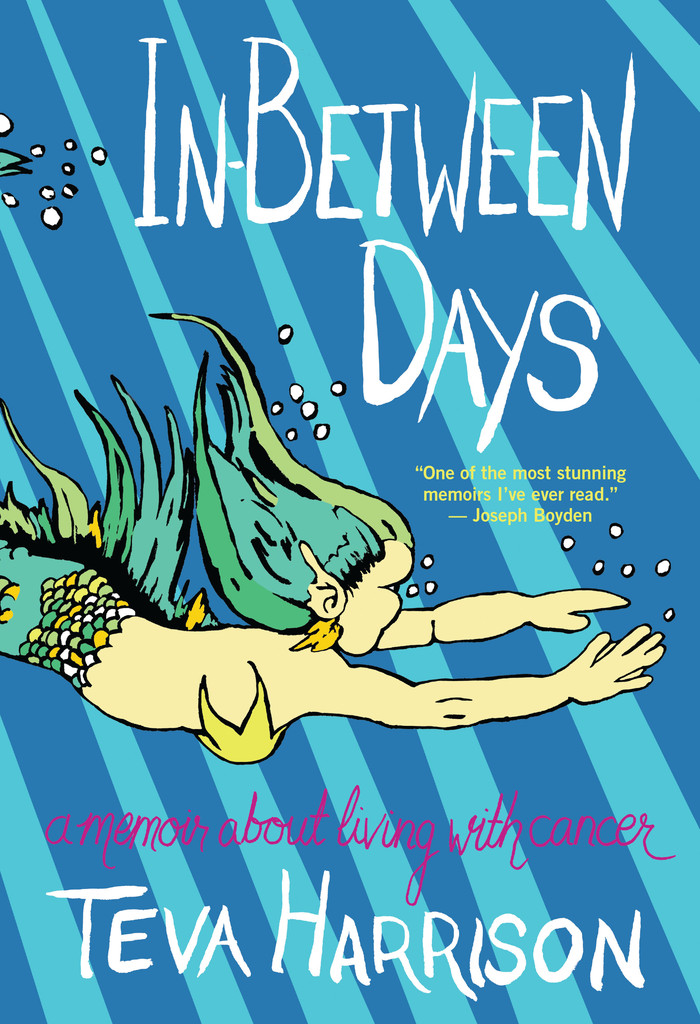Like this article? rabble is reader-supported journalism. Chip in to keep stories like these coming.
“I occupy the liminal spaces, slipping between unnoticed. The hours of cancer are strange. MRIs at 3:00 a.m., pain at 2:00 a.m., capable one day, incapable the next. It’s like living in the shadows,” writes Teva Harrison in her debut graphic memoir In-between Days, which chronicles her life with cancer. “And so I take the spaces nobody claims and I occupy them in the best way I know how: living life with a sense of wonder and delight.”
In-between Days begins like this, establishing Harrison’s jovial voice and wistful approach to life, despite being in a situation most would find disheartening.
At 37, Harrison was diagnosed with stage IV metastatic breast cancer — cancer that has spread to multiple organs and is incredibily difficult to cure — after years of unexplainable pain and constant reassurance from her doctors that she was healthy.
According to the Metastatic Breast Cancer Network, only seven per cent of breast cancer research funding in North America and the United Kingdom went to metastatic cancer research between 2000 and 2013. The majority of research grants are put towards curing cancer. Since metastatic cancer is currently largely incurable, the focus for these patients becomes to prolong life and promote a better quality of living.
“Our message can be harder to get out because we don’t have the shiny positivity of a cure. We are the story of the women who die,” says Harrison.
The median survival rate for stage IV breast cancer is three years. Harrison has been living with the disease for two and a half years, and is doing quite well.
She wants to raise awareness for metastatic cancer by sharing her story in In-between Days, the collection of comics and short personal essays, that has her undeniable vibrancy and spark.
Harrison never thought that she would be an author. What began as a series of comics to help cope with cancer, turned into a successful blog, which was soon noticed by The Walrus, then picked up by House of Anansi to be turned into a memoir.
An artist her whole life, she began drawing comics once she was diagnosed with metastatic breast cancer. The comics helped her cope, and she posted them on her blog in hopes that it would help others living with terminal cancer.
“I was trying to tell stories and pictures weren’t enough and words weren’t enough,” says Harrison. “In the book I tried to both tell a story and distill a little bit of my way of approaching the world, which is always looking for wonder and magic,” she says.
The book is extremely well-structured with short essays and corresponding artwork that allows the reader to jump from happy memories, to memorials, to feelings and fears, all with a fluidity and ease guided by her comics.
At first assumed to be a reference to The Cure, the title In-between Days is a nod to Harrison’s fondness of liminal spaces. Though she never thought she would occupy the in-between spaces like waiting rooms and doctors offices as she does now. “I always used to love, and I still have a bit of a fondness for the liminal spaces. I loved how on a bus or a plane you had that space to think and breathe. It’s not always as good to have space to think when you’re sick,” she said. “I feel like I’m living in a lot of grey areas, where I didn’t necessarily expect I would occupy.”
The first comic and short story address Harrison’s new relationship with the intermediary. Written around and between an illustration of hands reaching across dark, jagged cracks are the words “Now that I have cancer, I exist entirely in the in-between spaces and it’s hard to know — at any given moment — how close I am to the edges.”
But Harrison takes that space and makes the best of it, both in her work and in life. In-between Days offers a fresh perspective, approaching a topic that has inspired so many sad stories with an unexpected vibrancy. The reader gets to peek into a life that she sees as well worth living, regardless of circumstance. Harrison unabashedly shares her daily anxieties, stories about her loved ones, details of her (incredibly happy) marriage, memories, hopes and dreams, and sometimes treatment and pain.
There are aspects about living with cancer that readers might not have considered before reading thisbecause no one writes about illness like Harrison does.
As a young woman, she experiences illness differently and nothing she read spoke to her experience. She created what was missing, to cope and help others cope. “I had trouble finding something that spoke to me about what it feels like… I was looking for something that felt a bit more like this, something that talked about feelings, that acknowledged feelings, that talked about how to still be hopeful within the terminal diagnosis.”
I never thought I would laugh while reading a book about cancer. Yet Harrison’s work has an undeniable wit and poignancy, never missing a chance to point out the more absurd aspects of treatment.
In one of the comics titled “On A Platter” stereotactic radiation treatment made Harrison feel packaged like “supermarket sushi,” all vacuum sealed onto a bed. She found it so funny that she had to ask the technician to take a photo of her, so she could show her husband.
“This is a story about my life, it’s not a story about cancer itself,” she says. This book is not about cancer; it is about living with cancer. It captures a whole person, not just a diagnosis.
Lauren Scott is a former rabble books intern and an editor at The Leveller. A recent graduate from the Bachelor of Journalism program at Carleton University, she is now trying to find her way in the big, bad world of unemployment. Follow her on Twitter @laurenlizzscott



